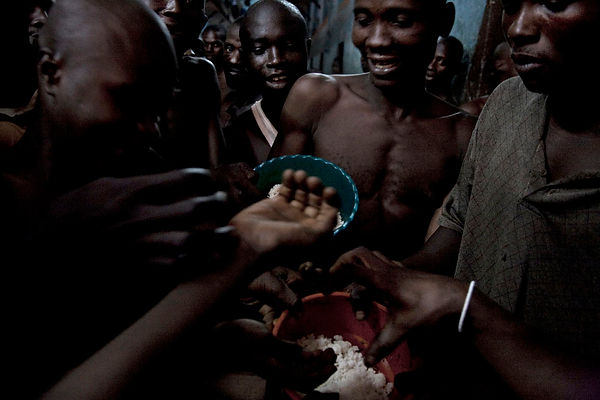WAITING FOR JUSTICE
MINORS IN ADULT PRISON
Sierra Leone
My arrival at Freetown´s Pademba Road prison in Sierra leone was tough: a white man with a camera and thirteen hundred prisoners living in terrible conditions. Many of them spend years awaiting trial. The lack of legal assistance keeps them defenceless. Their lives are placed in danger by the long sentences imposed on them, as well as the prison living conditions. Hygiene is non-existent, food and water are scarce, and there is a constant struggle for survival that sparks tension and violence. Moreover, the younger inmates suffer violence at the hands of the older adult prisoners.
I felt fear at the beginning of my stay in prison—the guards were few and unarmed, and I moved about by myself. Bit by bit, I gained the confidence of the inmates: thanks to my status as a qualified nurse, some of the prisoners showed me their diseases and I tried to help them, bringing medicines into the compound. I took pictures of their illnesses and consulted with pharmacies to reach a diagnosis and find a treatment. I have to say neither the International Red Cross nor any NGOs I had contact with volunteered medicine or any type of help for these forsaken beings.
Steven Lebbie was incarcerated in 2009, accused of stealing two sheep. In February 2010, I had the opportunity to photograph him in a state of great fear. He was no longer there when I returned in August; Steven had died of a general infection that spring. He was seventeen at the time. During his stay in prison, Steven never received a single visit.
My photo essay on minors in prison was published in the European press (The Independent, Le Monde Magazine, The Sunday Times, Liberation, NZZ, El País Semanal,…) but the story did not transcend beyond acquainting a broad audience with this tragedy. If I desired to truly help these jailed minors, my obligation was to take it one step further. The result has been to create FREE MINOR AFRICA (FMA), a project that offers legal aid and bail payments to those incarcerated for minor offenses. We will also help in their reinsertion back into society. It is fundamental to offer shelter to newly freed youth that have completed their sentence, but have no family or home to go to. Since 2013 me with two local teachers created the only school in the prison for young inmates called approved school. Since then and untill the year 2020 we are offering scholarization and facilitating the family reintegration of young people in their families.
PADEMBA ROAD PRISON
Mohamed Conteh, fourteen years old, was accused of possessing a small quantity of marihuana and spent four days in the police station without food. To be released, the police had asked for 30,000 leones (7.5 euros) which he did not have. After several months in prison, he was sentenced to three years in jail or pay a bail of 100,000 leones (25 Euros). Mohamed was a street urchin—after 10 years of civil war, thousands of orphans arrived to live on the streets of Freetown.
One of the endemic ills of the Sierra Leone justice system is that inmates spend years awaiting trial and sentencing. In 2004, Abdul Karim Sesay was sent to Pademba Road Prison with thirteen years of age. At the end of 2010, he was still awaiting trial, accused for being a member of a gang involved in a murder. Abdul has not received any legal aid and does not know the status of his case.
Abdul Moresey arrive to Pademba in 2007 as a child. He was charged with murder. The facts are that Abdul went to the river with his best friend and this was drowned. The child´s family accused Abdul of murder and he is four years pending trial.
Sentencing in this country is abnormally harsh, and the Sierra Leone government has pronounced that criminal responsibility begins at age ten, which is in clear conflict with the Convention for Child Rights ratified by the same government in 1990.
The third time I visited the prison, journalist John Carlin accompanied me. During those days, we were lucky to coincide with Abdul Sesay´s ongoing trial. Abdul was a sixteen-year-old boy that I had met months before in protective custody, the most difficult section to be in. He had not eaten nor drunken any water that day; he felt too weak to fight for his share of rice.
During the trial, we were able to release Abdul by paying a bail of 60 euros and presenting two people as guarantors, and sent him back to his family in his village. This saved Abdul from returning to Pademba Road prison to complete his 3-year sentence.
This work was mostly shot in Pademba Road Prison where 32 children, between the years of 14 and 17, share prison life with 1,300 adults.

























































